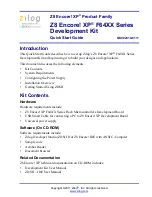
Preliminary
...the world's most energy friendly microcontrollers
2010-04-09 - t0005_1.10
12
www.energymicro.com
The example files above have been configured to be built for both the EFM32_G2xx_DK and
EFM32_G8xx_DK kits, with the EFM32G290F128 and EFM32G890F128 part numbers. Select the
project that matches your setup to ensure correct operation.
7.5 How to include in your own applications
The easiest way to include the BSP in your application is to base your work on one of the example
applications, for instance the easy "blink" demonstration. The following items are recommended for
correct configuration:
1. Make sure you define the correct part number (e.g. EFM32G290F128) as a preprocessor defined
symbol
2. Make sure you define the correct part number (e.g. EFM32G290F128) for your IAR EWARM / Keil
MDK-ARM project
3. Add and include the EFM32_CMSIS-files (startup_efm32.s, system_efm32.c, core_cm3.c) to your
project
4. Add and include _all_ BSP package .c-files, with the dvk-prefix to your project
5. Configure include paths to point at the CMSIS/CM3/CoreSupport and CMSIS/CM3/DeviceSupport/
EnergyMicro/EFM32 directories
6. Configure include paths to point to the dvk/bsp directory
Make sure you call "DVK_init()" early at startup, and you should be all set.
7.6 Chip errata
Early versions of the development kit are shipped with EFM32 Engineering Samples on the MCU
modules. There has been updates to configuration and reset values that needs to be configured correctly
on these early parts. We recommend always starting your application with a call to
#include "chip.h"
void CHIP_init(void);
to ensure correct and stable behavior. See the BSP examples for details. We recommend also to
download and read the latest errata from the Energy Micro website for your part number.
electronic components distributor













































